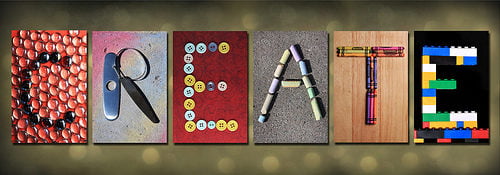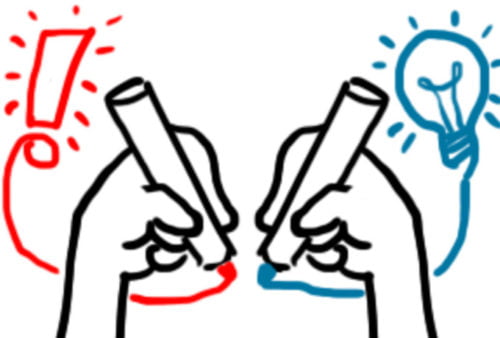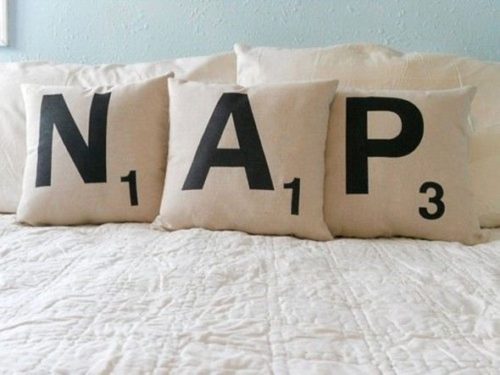 In my childhood church in Chattanooga, TN, I was raised by many teachers. One of them was a woman who ran the children's choir program. Though she was active in the church in almost every way, never did you hear her sing in church. One day I asked why.
In my childhood church in Chattanooga, TN, I was raised by many teachers. One of them was a woman who ran the children's choir program. Though she was active in the church in almost every way, never did you hear her sing in church. One day I asked why.
“I used to sing a lot in public,” she offered my questioning.
“You did?” I was shocked.
“What happened?”
“Well, it was about 10 years ago. I sang my heart out one Sunday night. I really felt good about what I sang and the way I sang it. But then somebody in the congregation came up to me afterwards and told me all the ways I could have improved my song closing with ‘You should really leave the singing up to others.’”
My jaw dropped as she went on, “So I decided then and there at that moment that I would never sing again in church. I’d teach kids to sing. I’d sing in a group. But, never would I sing alone.”
I still remember this conversation because of how sad I felt afterwards. Here, this friend and mentor of mine was so swayed by one person’s criticism of her musical gifts that she vowed NEVER to sing again in public. What a tragedy that her gifts could not be shared with the larger community.
Though this might seem like somebody else’s tale, we know it’s not. So many of us share this same story!
Though as children we showed an inclination toward singing or drawing or gardening or cooking or building or countless other creative tasks, so many of us find ourselves in adulthood saying, “I’m not a creative person.”
And we look to other people to be that. Somebody else can write the stories. Somebody else can paint the paintings. Somebody can cook at the dinner parties. We’ve long given up the work of the right side of our brains in exchange for spreadsheets, structured schedules and paint-by-number lives without room for creativity to take us where it may.
In fact, in Big Magic: Creative Living Beyond Fear author Elizabeth Gilbert offers some of the best excuses we give for our lack of creativity.
We’re afraid we don’t have talent.
We’re afraid somebody else did it better.
We’re afraid we don’t have the right type of discipline.
We’re afraid we don’t have the right type of training or degree.
We’re afraid we’re too fat. (Gilbert goes on to add… I don’t know what this has to do with creativity, exactly but experience has taught me that most of us are afraid we’re too fat, so let’s just put that on the anxiety list, for good measure.)
We’re afraid our best work is behind us.
We’re afraid we’re too old to start, too young to start . . .
You get the picture, don’t you? When it comes to calling ourselves creative… it’s so easy to say that we’re not.
But then, what do we do when we arrive at texts of scripture like Genesis chapter one that say:
“In the beginning God created the heavens and the earth. . . “
What do we do when we realized that the very first verb used to describe God in all of scripture is this one—God created . . .
This past Sunday I was preaching at St. Matthew's Presbyterian Church in Silver Spring, MD and I posed to them this question:
What then, does the creation story say about us?
As we keep reading the rest of Genesis 1, what we read is a full-on, detailed description of all of the creative activities of our God. The world, we are told, comes to be through God’s creative self: weaving together light and dark, sound and quiet, gathering and scattering, planting and harvesting as well as multiplying and ceasing. We read about how our God created something that was never imagined, conceived or seen before “In the beginning.”
There’s no way we can get around understand who God is without talking about God’s creativity!
And then God takes the creative process one step further saying in verse 26: “Let us make humankind in our image . . . And God created humankind in his image, in the image of God he created he created [us] male and female.”
Human beings come to form, creations specifically made in the image of the Creator.
And what’s the expectation, then of us who are born of this creative God?
Creativity, of course. We are welcomed as active participants into the ongoing creation as God continues to bring forth beauty, love and connection between all the creators of this world. Simply put: we aren’t off the hook when it comes to creativity.
Just as God is creative, we who are created as the image bearers of our Creator are to create.
No exceptions. No “someone told me I’m not good enough.” “No “I don’t have time.” No “I’m too young to be taken seriously.” No, “I’m too old to start.”
No.
The God we meet in Genesis chapter 1 is the God who moves in creative steps and asks us to do the same.
But this seems like a daunting task doesn’t? How is this even possible?
If you’ve ever poured yourself into a long endeavor of writing a story, or spend a long afternoon re-planting flowers in the yard, or tried something new like a cooking or computer class at a local community center—you know how you feel afterwards--- pooped. Brain fried. Ready for a nap. A break. A time out among something or someone who restores your soul.
Rest, you see, is a natural rhythm of true creativity.
We are not made to produce all the time. We not made to listen to all the voices surrounding us all the time. We are not made for the busyness of what it means to be a citizen on this earth all the time.
We are made to rest too.
Maybe this is why scripture tells us that after God created humankind, God “rested from all the work that he had done in creation.”
Even Almighty, all-powerful, all-knowing God took a nap.
So why do we think our lives would be any different?
You see, I’m thinking today that all our resistance to our Creator’s invitation to create alongside, is not just about comparison of talents or that time that so and so told us that we were no good, but it’s about our inability to embrace a life of Sabbath: time set-apart in our weeks for listening, not doing, sitting still, not rushing on, and reflecting on what’ve we done, calling it “good” too.
Without a practice of Sabbath, our inclination to creativity, as our God has gifted us, simply doesn’t happen.
Many of you know that a large part of my ministry is writing. I’ve written a book. I write op-eds for Christian publications. I write sermons. I spend a lot of time during the week in front of my computer. A question I’m often asked is:
How do I not run out of things to say?
Well, there’s one thing I’ve learned as I’ve leaned into my creativity and said yes to God’s calling on my life to write it is that my best ideas and strongest motivations to follow through come when I’ve rested. Both literally in the night but also rested by taking time off from work.
I have to tell you that sometimes it’s annoying! Laying on my pillow at night with ideas flowing on something at 11 pm when I wish I could just sleep. Or getting a great idea for a sermon when I’m in a week when I’m not preaching the following Sunday.
Rest and Sabbath keeping is what gives me the courage to be creative. Without Sabbath keeping, the creative life dies. At least it's what I know for sure.
So when are you going to stop and rest? It might just lead you to do something creative. . . . something beautiful.